warnings
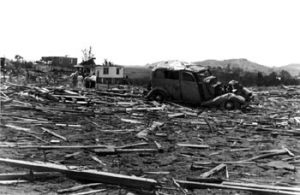 Tornado warnings and warning sirens are things that just about every person knows about these days, but in 1944, they weren’t available at all. It wasn’t that no one had thought about a tornado warning system, but rather that they had and they decided against it,and so nothing was developed. If you’re like me, you wonder why anyone would think it a bad idea to warn people about the possibility of a tornado, but that was exactly what happened. According to a report titled “The History (and Future) of Tornado Warning Dissemination in the United States” by Timothy A. Coleman, Kevin R. Knupp, James Spann, J. B. Elliott, and Brian E. Peters, “Despite promising research on the conditions that are favorable for tornadoes in the 1880s by John P. Finley, a general consensus was reached among scientists in the 1880s and 1890s that tornado forecasts and warnings would cause more harm than good. A ban was placed on the issuance of tornado warnings from 1887, when the U.S. Army Signal Corps handled weather forecasts, until 1938, when the civilian U.S. Weather Bureau (USWB) finally lifted the ban.” Even after the an was lifted, warnings were pretty primitive. Modern tornado warning really took off and began to develop in 1948…too late for the people of West Virginia and Pennsylvania on June 23, 1944.
Tornado warnings and warning sirens are things that just about every person knows about these days, but in 1944, they weren’t available at all. It wasn’t that no one had thought about a tornado warning system, but rather that they had and they decided against it,and so nothing was developed. If you’re like me, you wonder why anyone would think it a bad idea to warn people about the possibility of a tornado, but that was exactly what happened. According to a report titled “The History (and Future) of Tornado Warning Dissemination in the United States” by Timothy A. Coleman, Kevin R. Knupp, James Spann, J. B. Elliott, and Brian E. Peters, “Despite promising research on the conditions that are favorable for tornadoes in the 1880s by John P. Finley, a general consensus was reached among scientists in the 1880s and 1890s that tornado forecasts and warnings would cause more harm than good. A ban was placed on the issuance of tornado warnings from 1887, when the U.S. Army Signal Corps handled weather forecasts, until 1938, when the civilian U.S. Weather Bureau (USWB) finally lifted the ban.” Even after the an was lifted, warnings were pretty primitive. Modern tornado warning really took off and began to develop in 1948…too late for the people of West Virginia and Pennsylvania on June 23, 1944.
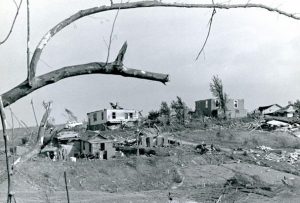
On that June 23rd in 1944, a series of tornadoes across West Virginia and Pennsylvania kill more than 150 people. Most of the twisters were classified as F3, but the most deadly one was an F4 on the Fujita scale, meaning it was a devastating tornado, with winds in excess of 207 miles per hour. The afternoon was very hot, when atmospheric conditions suddenly changed and the tornadoes began to form in Maryland. At about 5:30 pm, an F3 tornado, with winds between 158 and 206 miles per hour, struck in western Pennsylvania. That storm killed two people. Just Forty-five minutes later, a very large twister began in West Virginia, and moved into Pennsylvania. It then tracked back to West Virginia. By the time this F4 tornado ended, it had killed 151 people and leveled hundreds of homes. Another tornado struck that afternoon at a YMCA camp in Washington, Pennsylvania. A letter written by a camper was later found 100 miles away. Area Coal-mining towns were also hit hard on June 23rd. There were some reports that a couple of tornadoes actually crossed the Appalachian mountain range, going up one side and coming down the other…a very rare event with any mountain. Finally, about 10 pm, the remarkable series of twisters finally ended, after the last one hit in Tucker County, West Virginia. In all, the storms caused the 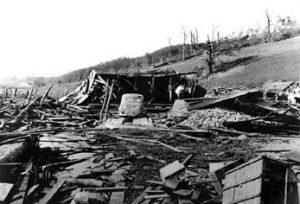 destruction of thousands of structures and millions of dollars in damages, and that was just the monetary losses.
destruction of thousands of structures and millions of dollars in damages, and that was just the monetary losses.
While there isn’t much that can be done to spare property in the path of tornadoes, an early warning, and the appropriate action taken, can save the lives of hundreds of people. Sadly, early warnings were not available to save the 153 people killed in the tornado outbreak of June 23, 1944. They were still in the works, because of all the years wasted when scientists decided it was not in the public’s best interest to know about tornadoes. I’m really thankful that the ban was lifted and we have these necessary warnings these days.
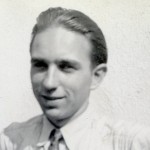
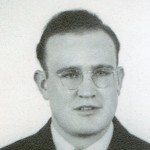 In August of 1964, my dad, Allen Spencer bought a Hollywood Reloading Press from his brother, William Spencer. Uncle Bill is two years older than my dad, and he loved his little brother, was always protective of him, and took him under his wing. As a little boy, Dad was really proud of his big brother, and wanted to say “brother” very badly, but he couldn’t quite get the word out correctly. Instead it always came out “Bowa” when Dad said it. After a while “Bowa” stuck, and the brothers both used it often. When Uncle Bill sent Dad the Reloading Press, he sent with it, a letter carefully explaining its safety instructions and its warnings. While going through Dad’s things, we came across that letter. It was such a treasure to find it, because it so perfectly depicted the relationship the brothers had.
In August of 1964, my dad, Allen Spencer bought a Hollywood Reloading Press from his brother, William Spencer. Uncle Bill is two years older than my dad, and he loved his little brother, was always protective of him, and took him under his wing. As a little boy, Dad was really proud of his big brother, and wanted to say “brother” very badly, but he couldn’t quite get the word out correctly. Instead it always came out “Bowa” when Dad said it. After a while “Bowa” stuck, and the brothers both used it often. When Uncle Bill sent Dad the Reloading Press, he sent with it, a letter carefully explaining its safety instructions and its warnings. While going through Dad’s things, we came across that letter. It was such a treasure to find it, because it so perfectly depicted the relationship the brothers had.
Always the big bowa, Uncle Bill was very excited that my dad wanted a reloading press, and since Uncle Bill was a gun dealer, who else would Dad have gone to when he wanted to make such a purchase. For those who don’t know, a Hollywood Reloading Press turns used ammunition into loaded ammunition again. Uncle Bill loved guns and all the accessories, and so it stood to reason that Dad would follow suit. The brothers had always used guns for hunting and safety, and even dynamite for blowing out tree stumps…and the occasional gate post. While boys would be boys, these boys weren’t troublemakers, but were rather careful and respected these items. They knew that improper use could be deadly. While my dad had grown up knowing about guns, Uncle Bill knew that he had not used a reloading press before, and he wanted to make sure nothing went wrong. It wasn’t that Uncle Bill thought my dad was careless, he just wanted him safe, and the reloader could bring danger, if not used correctly.
The letter, in my mind, was more about the love Uncle Bill had for my dad, than it was about the Hollywood 
 Reloading Press. Theirs was a close relationship that each of them treasured. Uncle Bill always loved writing letters. He always felt that the written documentation was forever. It carried with it the history of events that occurred in the life of the writer and the receiver. So few of us understand that, I think…at least not until it’s too late. The letter about the Hollywood Reloading Press will always be a treasure to all of my family. I’m sure that the letter was a treasure to my dad too, since he kept it all those years. And I will always think of “Bowa” when I think of the brothers now.
Reloading Press. Theirs was a close relationship that each of them treasured. Uncle Bill always loved writing letters. He always felt that the written documentation was forever. It carried with it the history of events that occurred in the life of the writer and the receiver. So few of us understand that, I think…at least not until it’s too late. The letter about the Hollywood Reloading Press will always be a treasure to all of my family. I’m sure that the letter was a treasure to my dad too, since he kept it all those years. And I will always think of “Bowa” when I think of the brothers now.
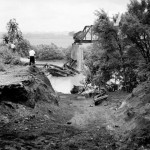 With all the rain we have been receiving, our area, along with many others have received multiple flash flood warnings, as well as flooding in many areas. When river water crosses a road, we are told not to drive through the flood, because it can take your car and cause your death. So many warnings are given to us in a flood situation. So much has been learned over the years about how to stay safe. So much has been learned about early warnings. So a lot of preparation is put in place, and yet, sometimes it’s just not enough. Such was the case on June 19, 1938.
With all the rain we have been receiving, our area, along with many others have received multiple flash flood warnings, as well as flooding in many areas. When river water crosses a road, we are told not to drive through the flood, because it can take your car and cause your death. So many warnings are given to us in a flood situation. So much has been learned over the years about how to stay safe. So much has been learned about early warnings. So a lot of preparation is put in place, and yet, sometimes it’s just not enough. Such was the case on June 19, 1938.
At that time, they didn’t have pickups that drove the rail system to check the tracks for problems. Instead a track walker was sent out to areas where there was a possible problem. Custer Creek is a small winding river that runs through 25 miles of the Great Plains on its way to the Yellowstone River. Minor streams like Custer Creek are prone to flash floods because their small capacity can quickly and easily be exceeded during heavy rains. A track walker was sent out to make sure everything was ok on the trestle at Custer Creek in Terry, Montana, and he reported that all was well there. Just a few hours later, a sudden downpour came through the area. The rising water in Custer Creek washed out the bridge and when the Olympian Special came through, it went crashing into the raging waters with no warning at all.
Two sleeper cars were immediately buried in the muddy waters, and the moonless night extremely hampered rescue efforts. In the end, 46 people lost their lives. The rear cars stayed above the water, but many passengers were seriously injured. To make matters worse, they could not be evacuated until the following morning. To hear of a train going into river in a flood is…at the very least, rare. I’ve heard of trains derailing…we all have, but this was different. On a moonless, pitch black night, my guess is that the engineer had no idea what 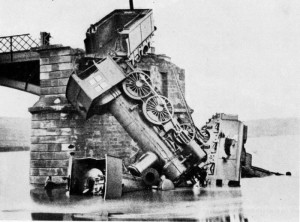 was about to happen. The shock must have been sickening to say the very least. Just knowing that people were going to die and there was nothing you could do about it, must have been the most horrible experience of an engineer’s life. Completely unimaginable.
was about to happen. The shock must have been sickening to say the very least. Just knowing that people were going to die and there was nothing you could do about it, must have been the most horrible experience of an engineer’s life. Completely unimaginable.
These days there are different safety measures in place, but that still doesn’t guarantee that such an event couldn’t happen again. I don’t know what the solution would be in these situations, but I’m sure that if there is one, technology will find a way to fix the problem. In those days, with the technology they had, they had done all they could, and yet, lives were still lost.

